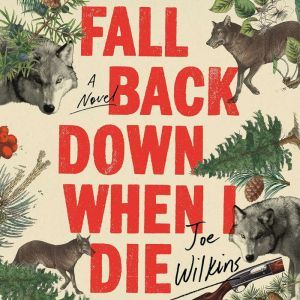Quotes
"Wilkins delivers a Shakespearean mix of drama and mortal danger in crisp and beautiful language...He renders the effects of violence and trauma on the daily machinations of human lives...The world of the novel, rural Montana, is presented with the native realism of someone familiar with the people, language, landscape, and controversies of the 'way out here'...He captures the social dynamic of communities of few people spread over many swaths of land...This novel instills hope. Wilkins has produced a remarkable book filled with characters who, despite their inherent differences over how to exist on the land, remind us of the myriad reasons that every person might be loved."—Jason Hess, The Oregonian
"A tense story delivered in sharp, evocative sentences, Fall Back Down When I Die captures what feel like eternal tensions of land, loyalty, and vengeance. . .Wilkins is also a talented poet, and his sense of sound and line seeps into his prose. . .He has a fine sense of pacing, imbuing the book's final quarter with an almost dizzying suspense. He's at his most poetic when setting the scene with descriptions that create a palpable atmosphere. . .These are melodies of pain and penance -- the right song for a novel about a riven land."—Nick Ripatrazone, National Review
"To read Joe Wilkins's first novel is to spend time in eastern Montana, to feel the sharp wind cutting across the cedar ridges, through the sagebrush and bunchgrass, kicking up dust that gathers into grit at the corner of your eyes. It is to hear the sweet, languid whistles of the meadowlarks in the fields. It is to feel "the gravel and the ruts and the old cracked tires" beneath you and to see, above you, always, the wide sky, its "whole box of colors" and its "extravagant stars," that pull of the sublime to lift your gaze from the intractable earth. And it is to know how hard-earned the beauty is. Wilkins achieves a rich evocation of place through seasoned language, tough and tender like the steak the characters are always eating. It is a landscape where they chew on their trouble, pick old bones, are gnawed at by their losses."—Holly Haworth, Orion Magazine
"Wilkins's novel feels insightful amid the ongoing debate over public land and legal rights, but it's also timeless, and it treads the same kind of territory as writers like Kent Haruf and Ivan Doig, digging into quiet stories of people living close to the land."—Heather Hansman, Outside
"There isn't a wrong note in Wilkins's novel. He manages to pull off the development of characters simultaneous with a growing sense of unease; the storm is becoming visible on the horizon...Wilkins is evolving into one of our best American writers."—Chris La Tray, The Missoulian
"Gorgeous...Spellbinding...The land itself is almost a living
character in the book, rendered both beautiful and ominous in Wilkins's poetic
prose...A gripping debut."—Sarah Gilman, High Country News
"Powerful...This is a story of realistic, complex characters whose lives intersect on a big canvas -- as big as eastern Montana...Joe Wilkins infuses his novel with a sense of personal attachment to both the history and current realities of life and conflict across the vast landscape."—Mindy Cameron, Lewiston Tribune
"Nuanced and textured...Fall Back Down When I Die seeks to point a way forward toward community and compassion, toward understanding."—Rachel Hergett, Bozeman Daily Chronicle
"The lurking menaces in the lives of each character in Fall Back Down When I Die are shadowy, elusive, and always just out of reach, complicated by a set of decades-old, interrelated conflicts...the oppressive poverty and hardship that lingers in the atmosphere is palpable."—Erin H. Turner, Big Sky Journal
"Stunning, haunting, and complex...Wilkins's combination of vibrant language and characterization elevates the novel...he forces readers to see beyond the stereotypes of rural America and embrace the characters as sophisticated and dynamic individuals...Wilkins's gifts as a seasoned poet and memoirist shine through in his use of figurative language, imagery, sentence fragments, and the way he builds up and tears down the threads of family. Fall Back Down When I Die is a timely addition to the literature of the West. It is a direct and unflinching representation of the way people, land, politics, and myth tangle with each other at the beginning of the twenty-first century."—Andrew Jones, Split Rock Review



